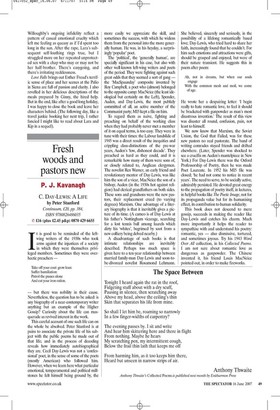Fresh woods and pastors new
P. J. Kavanagh C. DAY-LEWIS: A LIFE by Peter Stanford Continuum, £20, pp. 384, ISBN 9780826486035 © £16 (plus £2.45 p&p) 0870 429 6655 1 t is good to be reminded of the leftwing writers of the 1930s who took arms against the injustices of a society in which they were themselves privileged members. Sometimes they were overhectic preachers — Take off your coat: grow lean: Suffer humiliation: Patrol the passes alone And eat your iron ration.
— but there was nobility in their cause. Nevertheless, the question has to be asked: is any biography of a near-contemporary writer anything but an example of the Higher Gossip? Curiosity about the life can masquerade as revived interest in the work.
This careful account of one such life can on the whole be absolved. Peter Stanford is at pains to associate the private life of his subject with the public poems he made out of that life; and in the process of decoding reveals how immediately autobiographical they are. Cecil Day-Lewis was not a 'confessional' poet, in the sense of some of the poets (mostly American) who followed him However, when we learn here what particular emotional, temperamental and political millstones he felt himself being ground by, the more easily we appreciate the skill, and sometimes the success, with which he widens them from the personal into the more generally human. He was, in his heyday, a surprisingly 'popular' poet.
The 'political', the 'generally human', are specially significant in his case, but also with other well-known left-wing writers and poets of the period. They were fighting against such great odds that they seemed a sort of gang — the `MacSpaunday' composite invented by Roy Campbell, a poet who (almost) belonged to the opposite camp: MacNeice (the least ideological but certainly on the Left), Spender, Auden, and Day-Lewis, the most publicly committed of all, an active member of the Communist party; MI5 kept a file on him.
To regard them as naive, fighting and preaching on behalf of the working class when they had probably never met a member of it on equal terms, is too easy. They were in tune with their times: the Labour landslide of 1945 was a direct result of the inequities and crippling class-distinctions of the pre-war years, Auden's low, dishonest decade'. They preached as hard as they could, and it is remarkable how many of them were sons of, or closely related to, Anglican clergymen. The novelist Rex Warner, an early friend and revolutionary mentor of Day-Lewis, was like him the son of a vicar, MacNeice the son of a bishop; Auden (in the 1930s hot against religion) had clerical grandfathers on both sides. These sons and grandsons were the new pastors, their replacement creed (to varying degrees) Marxism. One advantage of a literary biography is that it inevitably gives a picture of its time. (A cameo is of Day-Lewis at his father's Nottingham vicarage, searching for a lost tennis ball among laurels which dirty his 'whites', begrimed by soot from a new colliery being delved nearby.) A disadvantage of such books is that intimate relationships are inevitably described. Perhaps too much space is given here to a ten-year relationship between married family-man Day-Lewis and soon-tobe-divorced novelist Rosamond Lehmann.
She believed, sincerely and seriously, in the possibility of a lifelong romantically based love; Day-Lewis, who tried hard to share her faith, increasingly found that he couldn't. For him such emotions and attractions were gifts, should be grasped and enjoyed, but were of their nature transient. He suggests this in poem after poem: Ah, not in dreams, but when our souls engage With the common mesh and moil, we come of age.
He wrote her a despairing letter: 'I begin really to hate romantic love, to feel it should be bracketed with gunpowder as man's most disastrous invention.' The result of this view was disaster all round, confusion, pain, not least to himself.
We now know that Marxism, the Soviet Union, the God that Failed, was for these new pastors no real pastorate. The band of writing comrades stayed friends and drifted elsewhere. (Later, Spender was shocked to see a crucifix on Auden's mantelpiece in New York.) For Day-Lewis there was the Oxford Professorship of Poetry, then he was made Poet Laureate. In 1952 his MIS file was closed; 'he had not come to notice in recent years'. The need to serve, to be socially active, admirably persisted. He devoted great energy to the propagation of poetry itself in lectures, in helpful books like The Poetic Image, not for its propaganda value but for its humanising effect, its contribution to human solidarity.
This book does not descend to mere gossip, succeeds in making the reader like Day-Lewis and catches his charm. Much more importantly it helps the reader to sympathise with and understand his poetry: romantic, yes — also dismissive, tortured, and sometimes joyous. Try his 1943 Word Over All collection, in his Collected Poems. I am not sure about romantic love as dangerous as gunpowder. The Chinese invented it, his friend Louis MacNeice pointed out, in order to make fireworks.




















































 Previous page
Previous page